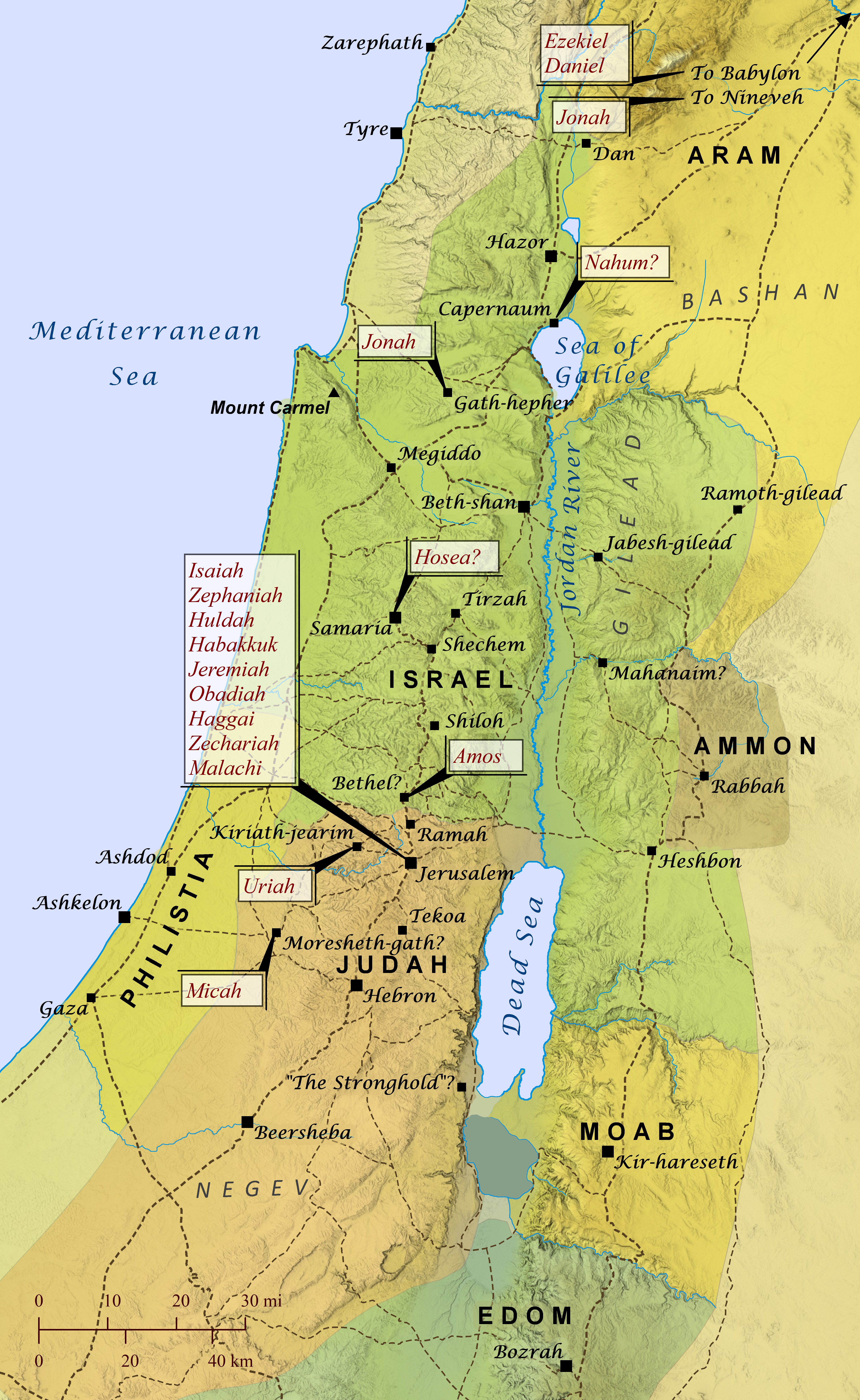Readers’ Version
Literal Version
1 The message from Yahweh which came to Tsefanyah (son of Kush, son of Gedalyah, son of Amaryah, son of Hizkiyah) in the time of Amon’s son, King Yoshiyyah (Josiah) of Yehudah (Judah)[ref]
I will exterminate everything that lives on the ground.
I’ll bring humans and animals to an end, along with the birds and fish. Wicked people will be destroyed along with their idols and humankind will be cut-off from the earth. 4 I will punish the people of Yehudah,
≈ and those living in Yerushalem.
I will wipe all remnants of Baal out from this place.
≈ No one will even remember the names of those priests who served idols.
5 I’ll punish those who bowed down to the stars and planets from their rooftops,
≈ and those making promises to Yahweh but then promising to the false god Milcom.[fn]
6 I’ll punish those who turn back after following me, Yahweh,
as well as those who haven’t searched for Yahweh or prayed to me.
7 Be silent in the presence of the master Yahweh,
because his day is near.
Yahweh has prepared a sacrifice,
and he’s consecrated his guests.
8 On the day of Yahweh’s sacrifice, I will visit their officials and the king’s sons, and all those wearing foreign clothing. 9 At that time I will punish all the officials who force their way into people’s homes—the ones filling their masters’ houses using fraud and violence.
On that day a cry of distress will come from the Fish Gate,
≈ and wailing from the second district
and a loud crash from the hills.
11 Wail, you inhabitants of the Maktesh,
because all of the people of Canaan will be destroyed.
All the money-counters will be eliminated.
12 I will search Yerushalem with lamps at that time,
and I will punish those who’ve sunk to the bottom—
the ones who tell themselves,
‘Yahweh will never take action—either good or bad.’
13 Their wealth will be taken as plunder
and their houses will be ruined.
They’ll build houses, but they won’t get to live in them.
≈ They’ll plant vineyards, but won’t get to drink their wine.
14 Yahweh’s big day of judgement is near—
≈ close and coming quickly.
The sound of Yahweh’s day is bitter—
≈ even warriors will cry out.
15 That day will be a day of anger,
a day of distress and anguish,
a day of destruction and desolation,
a day of darkness and gloom,
a day of cloud and thick darkness,
16 a day of trumpet blasts and with the battle cry
against the fortified cities and against the high towers on their corners.
17 I’ll bring distress to the people,
and they’ll walk slowly as if they were blind,
because they’ve sinned against Yahweh.
Their blood will be poured out like dust,
≈ and their innards like dung.
18 Their silver, and even their gold, won’t be able to save them
on the day of Yahweh’s anger.
The whole earth will be consumed in the fire of his jealousy
because he’ll soon destroy people from all over the world.
1:5 A variant of the name of the pagan god ‘Molek’ (or ‘Molech’, but also close to the Hebrew word for ‘king’ as found in some other translations).
2 Utterly_(destroy) I_will_bring_to_an_end everything from_under the_surface_of the_soil the_utterance_of YHWH.
3 I_will_bring_to_an_end human_being and_animals I_will_bring_to_an_end the_bird[s]_of the_heavens and_fish_of the_sea and_the_ruins with the_wicked and_cut_off DOM the_humankind from_under the_surface_of the_soil the_utterance_of YHWH.
4 And_stretch_out hand_of_my on Yəhūdāh and_against all_of the_inhabitants_of Yərūshālam/(Jerusalem) and_cut_off from the_place the_this DOM the_remnant_of the_Baˊal DOM the_name_of the_idolatrous_priests with the_priests.
5 And_DOM the_bow_down on the_roofs to_host_of the_heavens and_DOM the_bow_down the_swear to/for_YHWH and_the_swear in/on/at/with_milkom_of.
6 And_DOM the_turned_back from_following YHWH and_which not they_have_sought DOM YHWH and_not inquired_of_him.
7 Hush from_face/in_front_of my_master YHWH if/because is_near the_day_of YHWH if/because YHWH he_has_prepared a_sacrifice he_has_consecrated guests_of_his.
8 And_it_was in/on_day of_the_sacrifice_of of_YHWH and_punish on the_officials and_to the_sons_of the_king and_to all_of the_dress_in clothing foreign.
9 And_punish on every_of the_leap over the_threshold in_the_day (the)_that the_fill the_house_of master’s_of_their violence and_deceit.
10 and_it_was in/on/at/with_day (the)_that the_utterance_of YHWH the_sound_of a_cry_of_distress from_gate_of the_fish and_wailing from the_second_district and_crash great from_the_hills.
11 Wail Oh_inhabitants_of the_mortar if/because all_of it_will_be_destroyed the_people_of Kinaˊan/(Canaan) all_of they_will_be_cut_off the_weighers_of silver.
12 And_it_was in/on/at/with_time the_that I_will_search DOM Yərūshālam/(Jerusalem) in/on/at/with_lamps and_punish on the_men the_complacent on dregs_of_their the_say in/on/at/with_hearts_of_their not he_will_do_good YHWH and_not he_will_do_harm.
13 And_it_was wealth_of_their as_plunder and_houses_of_their as_waste and_build houses and_not they_will_dwell_in_them and_plant vineyards and_not they_will_drink DOM wine_of_their.
14 is_near the_day_of YHWH the_great near and_rapidly exceedingly the_sound_of the_day_of YHWH bitter is_shouting there a_warrior.
15 will_be_a_day_of fury the_day (the)_that a_day_of distress and_distress a_day_of devastation and_desolation a_day_of darkness and_gloom a_day_of cloud and_thick_darkness.
16 A_day_of trumpet and_battle_cry on the_cities the_fortified and_against the_corner_towers the_high.
17 And_bring_distress on_the_people and_walk like_the_blind if/because to/for_YHWH they_have_sinned and_poured_out blood_of_their like_the_dust and_flesh_of_their like_the_dung.
18 Neither silver_of_their nor gold_of_their not it_will_be_able to_save_them in/on_day of_the_fury_of of_YHWH and_in/on/at/with_fire_of jealousy_of_his all_of it_will_be_consumed the_earth/land if/because complete_destruction surely that_which_is_terrible he_will_make with all_of the_inhabitants_of the_earth/land.

